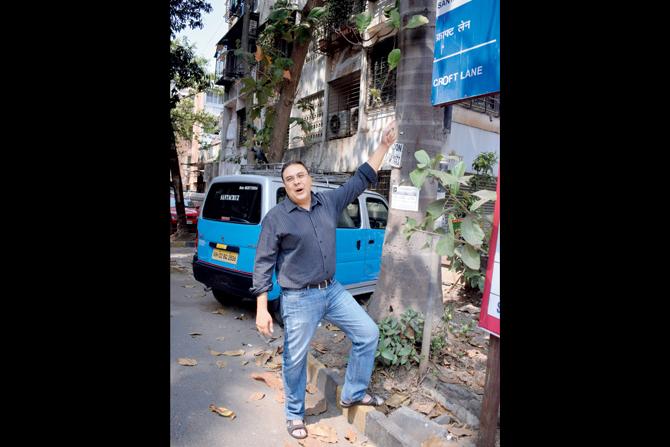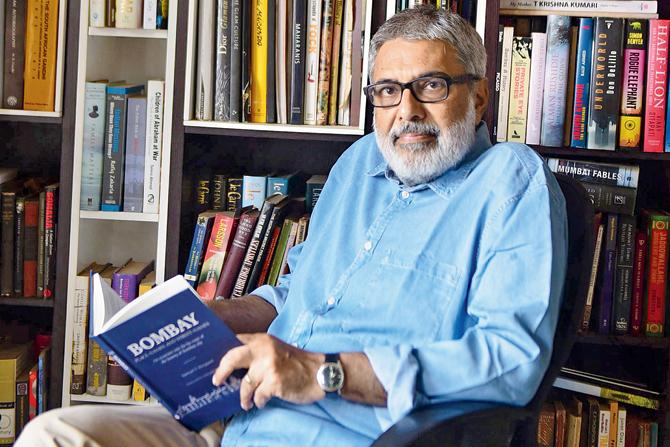Old Hanuman Lane on Kalbadevi Road is now Dhirubhai Parekh Marg, named after a man locals haven-t heard of. But, that wasn-t always the case. As the reprint of a 1917 book by Samuel T Sheppard reminds us, Mumbai-s roads have ingenious back-stories th

Rampart Row, kala ghoda Today called K Dubash Marg, the name of this road stretch at Kala Ghoda has changed twice already. Before Rampart Row, it was also called Rope Walk Street, because of a rope walk kept here for many years by the East India Company
In Santa Cruz West, not very far from the station, there is a township, where until 30 years ago, local resident and historian Debashish Chakraverty remembers with glowing pride, how trees on either side of the streets would meet in the sky to provide a lofty green cover. The area boasted of many such avenues.
ADVERTISEMENT
"That-s how the roads here got their names," Chakraverty tells us of his colony, Main Avenue, which further opens into North/South, West/East and Central avenues. This place now has a different name. The new BMC signage at the entrance of this residential colony reads: Main Avenue Road. "That-s an oxymoron," says Chakraverty. "If it-s an avenue, it cannot be a road, and vice versa."

Main Avenue, Santa Cruz, West
The residential colony, which further opens into North/South, West/East and Central avenues was named so, because the streets here, had trees growing on either side. Pics/Ashish Raje
Appalled by the lexical error, Chakraverty wrote to the BMC demanding that this mistake be corrected. When his emails went ignored, he logged on to Google Maps last year and edited the names of all the lanes on Main Avenue to erase the word "road". It took six months to get the approval. "But at least now, your Uber or Ola won-t show you a -Central Avenue Road-," he informs. What-s worrying though, says Chakraverty is that the local rickshaw- and taxiwallahs, who don-t rely on virtual maps to navigate the city-s streets, have no clue about the original names of these famed avenues. "In fact, you need to direct them to a landmark, if you want to get here," he says. And, all because some blocks on these avenues have got new identities - one named after Bengali novelist Sarat Chandra Chatterjee. This confusion persists across Mumbai, a city that was once all-embracing when it came to naming its streets and places.

Barber Lane, Fort
The lane between Cawasji Patel Street and Pitha Street named after an old pitha or liquor shop in Fort was formerly known as Barber Lane in the early 20th century. While some said that it got its name because barbers lived here, in 1915, the then municipal commissioner PB Cadell claimed it could have been named after a police officer named Barber. A letter sent to a newspaper later pointed out that Barbary pirates once had their dens on this street
Last year, renaming of streets was the second-most discussed issue in the BMC. "There has been a concerted effort [on part of the administration] to do away with names that are foreign, colonial or perceived to be not their [BMC] version of Indian," feels Chakraverty.
But the politics of Mumbai-s street-naming aside, Indus Source Books- reprint of a forgotten, yet important 102-year-old city book by historiographer Samuel Townsend Sheppard titled Bombay Place-Names and Street-Names, points to how our romance with Mumbai-s old streets will never end.
Written over a century ago, the book doubles up as an encyclopedia, which offers historical and documented explanation, as well as myths surrounding the origins of names of streets in then Bombay, which stretched from Colaba to Mahim.

When the BMC put up new sign boards, Croft Lane near Main Avenue in Santa Cruz West was erroneously spelled as Craft, until local resident Debashish Chakraverty wrote to the authorities to get it changed
A nostalgic journey
"Unlike many cities in India and abroad, which have a structured system when naming roads, places in old Bombay got their names more organically," says veteran journalist Sidharth Bhatia, who has written the foreword for the new edition of Sheppard-s book. Here, he reveals how New York, for example, follows a grid system that divides the city into avenues and side streets, while Delhi-s "wide boulevards" are named after grand Mughals and cultural figures, and the inner streets of its recently-developed residential enclaves segmented into blocks.
"From my own reading of the book, I am deducing that Bombay got its road names soon after the Bombay Municipal Corporation was founded [in 1888], so that it became easier to map the city," he says. "Traditionally, streets in Bombay came to be named after the temple/church located in the area, influential people or landlords who lived there, communities that inhabited the place Israeli Moholla, the place where the Bene-Israeli-s first moved, before settling in Umarkhadi, professions Dalal Street or Hamam Lane, today Ambalal Doshi Marg or after the commonly found flora and fauna Ash, Oak and Fanaswadi lanes," says Bhatia. There were also roads named after the "Governors and makers of Bombay". And so, unlike the popular myth that most of the names were colonial hand-me-downs, the streets represented a diverse group of people and time in history.

Sidharth Bhatia
The book is also imbued with fascinating legends surrounding the naming of certain streets. For instance, the genesis of Barber lane, which stretched from Cawasji Patel Street to Pitha Street in Fort, has always been uncertain. While some said that it was named after the barbers in the city, who had houses here, in 1915, the then municipal commissioner PB Cadell claimed it could have been named after a police officer named Barber. A letter sent to a leading English newspaper later, however, pointed out that Barbary pirates Ottoman and Maghrebi pirates once had their dens here. Then there is Rampart Row today K Dubash Marg, Kala Ghoda, which was formerly also called Rope Walk Street, because of a rope walk kept here for many years by the East India Company for manufacture of coir ropes.
What-s in a name?
In 2016, RTI activist Anil Galgali had written a letter to the BMC, demanding an explanation for why Old Hanuman Lane on Kalbadevi Road, which had got its name after the two centuries-old Hanuman temples there, had suddenly been changed to Dhirubhai Parekh Marg. "Nothing came of the letter. But, if I remember, nobody in that area even knew who Dhirubhai was. I understand that you are opposed to foreign names, but Hanuman is part of our Indian tradition. Why change that?"
Galgali says that this happens, despite the BMC following a very rigorous process for renaming of streets, which includes clearing the proposal at the local ward office level, before it is discussed at the works committee city or suburbs, and finally, in the corporation.
"I think we need more local participation in such decisions," says Bhatia. "Because renaming of streets does affect a city-s character." Chakraverty adds, "When you change the name of a street, you are also erasing its history. We need to value our past, instead of denying it."
Catch up on all the latest Mumbai news, crime news, current affairs, and also a complete guide on Mumbai from food to things to do and events across the city here. Also download the new mid-day Android and iOS apps to get latest updates
 Subscribe today by clicking the link and stay updated with the latest news!" Click here!
Subscribe today by clicking the link and stay updated with the latest news!" Click here!






